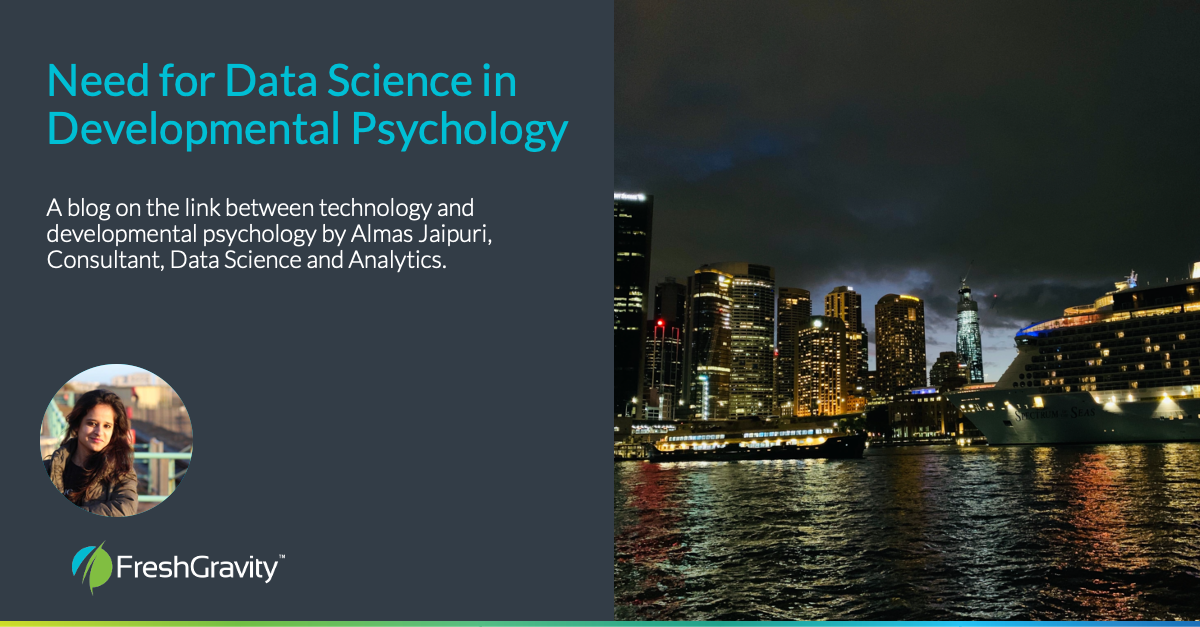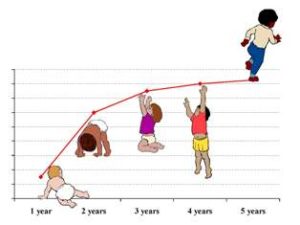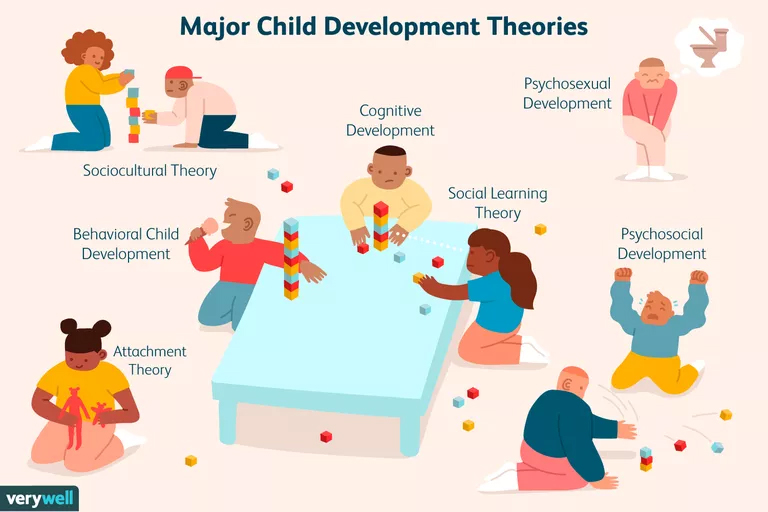

Image Credit: Sprouts
Developmental psychology is the scientific study of how and why human beings change over the course of their life originally concerned with infants and children. Developmental psychologists aim to explain how thinking, feeling, and behaviors change throughout life. This field examines change across three major dimensions:
- Physical development refers to the proportional growth of a child across the various phases of their life which leads him/ her to lead a healthy life.
- Cognitive development is how a person perceives, thinks, and gains understanding of their world through the relations of genetic and learning factors. There are four stages to cognitive development – information development, reasoning, intelligence, language, and memory.
- Social emotional development is an important area that needs to be developed through education. Through this, a child learns to acquire a capacity to understand, analyze, express, and manage emotions. He/she also learns how to develop a relationship with others facilitating growth in social-emotional skills.
Within these three dimensions are a broad range of topics including motor skills, executive functions, moral understanding, language acquisition, social change, personality, emotional development, self-concept, and identity formation.
Everyone leaves a digital footprint wherever they go, from the way they interact with people online through social media, to the way children respond to their digital surrounding such as smartphones, online gaming, or content streaming. This trail of data, and the conclusions that can be drawn from it, is valuable to educational institutions for decision making and development management, but it takes experts to turn these behavioral datasets into meaningful insights. Developmental psychology is concerned not only with describing the characteristics of psychological change over time but also seeks to explain the principles and internal workings underlying these changes. Data Science provides us with a mechanism to drive new insights to better understand these factors and improve outcomes for children.
With advances in computing techniques, it is possible to ingest all this information through powerful big-data platforms. Furthermore, with the data that is extracted, data scientists can apply various predictive analytical techniques such as Natural Language Processing (NLP) & clustering techniques to identify the similar patterns of behavior, forming them into groups and designing better teaching formats with iterative evaluation to improve it. This helps the educational institutions to understand the psychology of the students and aid them in their development.
Applications of Data Science in Developmental Psychology
Physical Health

Image Credit: who.int
The field of pediatrics is responsible for maintaining a regular assessment of a child’s growth or any abnormality in the growth phases which can be common in a child’s lifespan. When the health data for each child is collected from their respective clinics and monitored by a developmental group or a similar department, schools can intervene to help in regulating the diet and activity patterns for each individual child.
Providing regular reports about a child’s mood, response towards the activities and learning and nutrition intake to parents and caregivers can help in sustaining a proper growth pattern. It can also help in identifying any abnormal patterns sooner in a child which might be related to a disability, hindered growth, or difficulty in coping up.
The collective data across all the sections of society along with a wide variety of features such as parents history, immediate environment, developmental health data can be analyzed to identify patterns across a wider audience and cluster them which can predict certain unhealthy habits or behaviors and can help in designing better growth strategies.
Cognitive Abilities

Image Credit: VeryWellMind
Cognitive abilities are brain-based skills that are required to carry out any task from the simplest to the most complex. They have more to do with the mechanisms of how we learn, remember, problem-solve, and pay attention, rather than with any actual knowledge. Score results from each test and activity across the curriculum can be analyzed to identify difficulty level for each child to improve their mental math, reading and critical thinking abilities.
As a study described in Malcolm Gladwell’s book, Outliers, just a rearrangement of study groups or sections in schools can have a major impact over the performance of a child in the longer run. Placing every student into a group of students who respond similarly to the learning of cognitive abilities helps in improving instincts.
Using the score results to identify such clusters of groups and designing custom programs for each group as per their ability and mental standards can surely improve the performance of an educational institution.
Using various statistical measures and monitoring techniques, data science can be very useful in analyzing the industrial patterns and help the course creators to imbibe useful topics.
Emotional Intelligence

Image Credit: The Enterprisers Project
Emotional Intelligence is the capacity to be aware of, control, and express one’s emotions, and to handle interpersonal relationships judiciously and empathetically.
Collecting quantitative data about the moods and activity levels of each child along with analyzing the textual data (using NLP and Text Analytics) such as essays, reading interests, genre of books issued can reveal data regarding the emotional response or stress levels of a child which can be mapped with the social economic data of the family and society of the child. The resulting data can help a lot in identifying the behavioral patterns of a child which can be reported to parents/ doctors immediately in any alarming situation which otherwise a child might not be able to report or identify himself.
Also, analyzing the response data can also help an educational institution in better designing the curriculum or hiring emotionally sensitive staff. A simple outlier detection algorithm can perhaps reveal new emotional modes or significant emotional stressors to pay attention to.
Improving Assessment
There are several evaluation and assessment techniques that are utilized by educational institutes. However, such traditional methodologies were often unable to capture and encapsulate all the important trends and patterns of student services. With the advancements in Big Data analytics, it is now possible for the teachers to scrutinize their student requirements based on their performance and reviews.
A data platform will treat its users with a zero bias, meaning that there will not be any bias in the evaluation of student performance. This will provide an equal platform for all the students to engage and develop their skills.
Case Study
The University of Florida used a modern data platform for reporting, analyzing, and monitoring events through interactive visualizations. Using this, the university can analyze and predict student performances. The resulting algorithm used a variety of variables like student background, demographics, high school grades, the economic background to assess the dropout probability for the students.
Generating these insights, the University is better positioned to create policies and intervene to improve student performance before they drop out.
Potential Use Cases
- Detecting Anomalies for different behaviour
The internal data recorded for each child linked with the external data can be analyzed and modelled to identify the extreme behavioral or physical patterns. This can uncover the symptoms for any serious defects and can be taken care of at a much earlier stage.
- Skills Segmentation
Analyzing the test scores and activity response data by using unsupervised algorithms to segment the group of students based on the skills they excel in. This can help to identify the child’s interests and focus on that at an early stage of development.
- Sentiment Analysis
Using children and parent’s feedback/review data to run sentiment analysis algorithms can help institutions in tapping the overall response towards the conduct and curriculum being followed and make necessary changes.
- Automatic Assessment Techniques
Using a data platform to conduct and store test results to be validated by the rule-based assessment model enables a bias free testing environment. It can also be used to assess the relative performance of students to better design the assessment criteria.
Conclusion
Currently, the application of data science to the field of Developmental Psychology has been limited. It is time to take advantage of advances in machine intelligence with a practical understanding of developmental psychology to introduce breakthroughs in this area.
We have discussed how data science is becoming an effective tool for shaping academic skills along with non-academic skills like social-emotional skills. These methodologies can very well be utilized and quantified in Developmental Psychology.
It is said that life is best lived forward, but it is also true that life can be best understood in reverse. Successful and happy lives for every individual are grounded in a strong childhood and we should act upon data to improve that experience for our future generations.






Leave a Reply